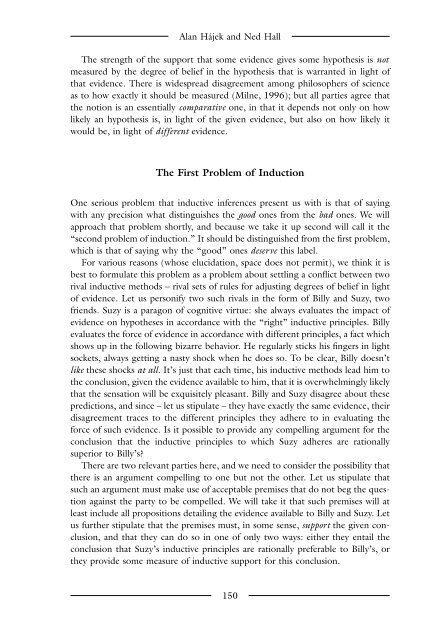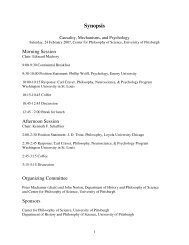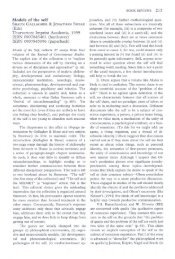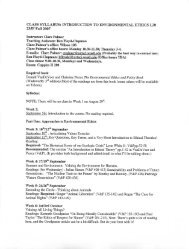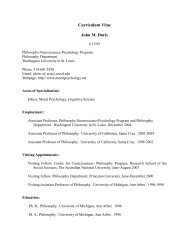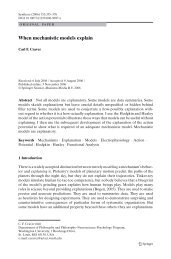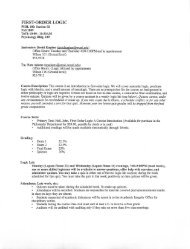The Blackwell Guide to the Philosophy of Science - The Department ...
The Blackwell Guide to the Philosophy of Science - The Department ...
The Blackwell Guide to the Philosophy of Science - The Department ...
You also want an ePaper? Increase the reach of your titles
YUMPU automatically turns print PDFs into web optimized ePapers that Google loves.
Alan Hájek and Ned Hall<br />
<strong>The</strong> strength <strong>of</strong> <strong>the</strong> support that some evidence gives some hypo<strong>the</strong>sis is not<br />
measured by <strong>the</strong> degree <strong>of</strong> belief in <strong>the</strong> hypo<strong>the</strong>sis that is warranted in light <strong>of</strong><br />
that evidence. <strong>The</strong>re is widespread disagreement among philosophers <strong>of</strong> science<br />
as <strong>to</strong> how exactly it should be measured (Milne, 1996); but all parties agree that<br />
<strong>the</strong> notion is an essentially comparative one, in that it depends not only on how<br />
likely an hypo<strong>the</strong>sis is, in light <strong>of</strong> <strong>the</strong> given evidence, but also on how likely it<br />
would be, in light <strong>of</strong> different evidence.<br />
<strong>The</strong> First Problem <strong>of</strong> Induction<br />
One serious problem that inductive inferences present us with is that <strong>of</strong> saying<br />
with any precision what distinguishes <strong>the</strong> good ones from <strong>the</strong> bad ones. We will<br />
approach that problem shortly, and because we take it up second will call it <strong>the</strong><br />
“second problem <strong>of</strong> induction.” It should be distinguished from <strong>the</strong> first problem,<br />
which is that <strong>of</strong> saying why <strong>the</strong> “good” ones deserve this label.<br />
For various reasons (whose elucidation, space does not permit), we think it is<br />
best <strong>to</strong> formulate this problem as a problem about settling a conflict between two<br />
rival inductive methods – rival sets <strong>of</strong> rules for adjusting degrees <strong>of</strong> belief in light<br />
<strong>of</strong> evidence. Let us personify two such rivals in <strong>the</strong> form <strong>of</strong> Billy and Suzy, two<br />
friends. Suzy is a paragon <strong>of</strong> cognitive virtue: she always evaluates <strong>the</strong> impact <strong>of</strong><br />
evidence on hypo<strong>the</strong>ses in accordance with <strong>the</strong> “right” inductive principles. Billy<br />
evaluates <strong>the</strong> force <strong>of</strong> evidence in accordance with different principles, a fact which<br />
shows up in <strong>the</strong> following bizarre behavior. He regularly sticks his fingers in light<br />
sockets, always getting a nasty shock when he does so. To be clear, Billy doesn’t<br />
like <strong>the</strong>se shocks at all. It’s just that each time, his inductive methods lead him <strong>to</strong><br />
<strong>the</strong> conclusion, given <strong>the</strong> evidence available <strong>to</strong> him, that it is overwhelmingly likely<br />
that <strong>the</strong> sensation will be exquisitely pleasant. Billy and Suzy disagree about <strong>the</strong>se<br />
predictions, and since – let us stipulate – <strong>the</strong>y have exactly <strong>the</strong> same evidence, <strong>the</strong>ir<br />
disagreement traces <strong>to</strong> <strong>the</strong> different principles <strong>the</strong>y adhere <strong>to</strong> in evaluating <strong>the</strong><br />
force <strong>of</strong> such evidence. Is it possible <strong>to</strong> provide any compelling argument for <strong>the</strong><br />
conclusion that <strong>the</strong> inductive principles <strong>to</strong> which Suzy adheres are rationally<br />
superior <strong>to</strong> Billy’s?<br />
<strong>The</strong>re are two relevant parties here, and we need <strong>to</strong> consider <strong>the</strong> possibility that<br />
<strong>the</strong>re is an argument compelling <strong>to</strong> one but not <strong>the</strong> o<strong>the</strong>r. Let us stipulate that<br />
such an argument must make use <strong>of</strong> acceptable premises that do not beg <strong>the</strong> question<br />
against <strong>the</strong> party <strong>to</strong> be compelled. We will take it that such premises will at<br />
least include all propositions detailing <strong>the</strong> evidence available <strong>to</strong> Billy and Suzy. Let<br />
us fur<strong>the</strong>r stipulate that <strong>the</strong> premises must, in some sense, support <strong>the</strong> given conclusion,<br />
and that <strong>the</strong>y can do so in one <strong>of</strong> only two ways: ei<strong>the</strong>r <strong>the</strong>y entail <strong>the</strong><br />
conclusion that Suzy’s inductive principles are rationally preferable <strong>to</strong> Billy’s, or<br />
<strong>the</strong>y provide some measure <strong>of</strong> inductive support for this conclusion.<br />
150


